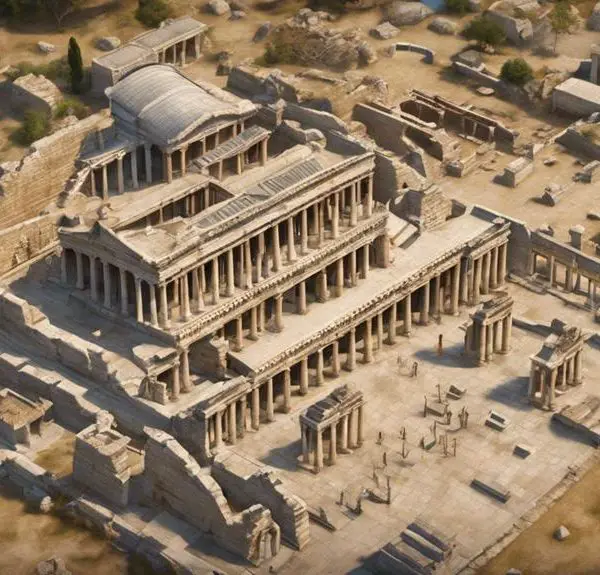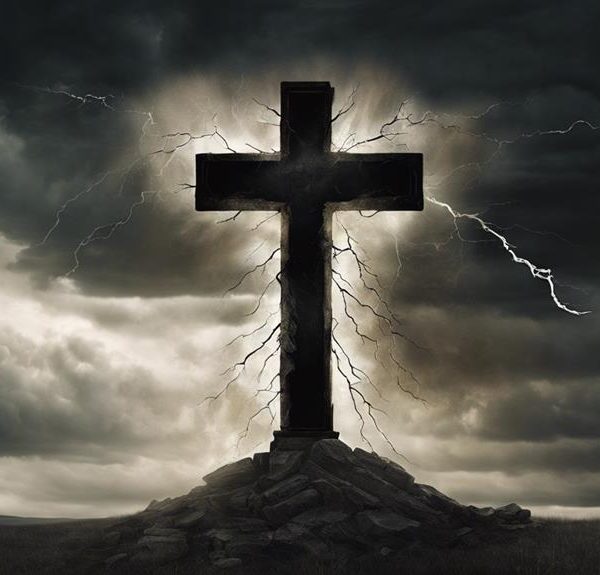Kaleidoscope of biblical eras unveil transformative truths, inviting you on a riveting journey through time, faith, and divine revelation.

Era in the Bible
Picture yourself journeying through the vast epochs of biblical history. From the poetic narrative of Genesis to the prophetic revelations of the New Testament, you'll encounter diverse eras, each bearing its own unique cultural, sociopolitical, and theological facets.
As you explore, consider what shifts in these eras can tell us about the unfolding message of the Bible. Do these transitions merely reflect historical change, or might they offer deeper insights into the enduring truths of faith?
Let's immerse ourselves in this intriguing quest, and maybe, just maybe, we'll uncover something profound.
Key Takeaways
- The Genesis Era sets the foundation of human nature and redemption in biblical narrative through stories like 'Adam's Dominion' and 'Noah's Legacy'.
- The Exodus Era marks the shift from slavery to self-rule, emphasizing courage, obedience, and faith in stories like 'Moses' Leadership' and 'Joshua's Conquests'.
- The Kingdom Age and Exile periods reveal the consequences of personal failures, division, and exile, strengthening faith and identity.
- The New Testament Times, including Paul's Conversion and the Revelation Prophecies, highlight divine transformation and provide hope, depicting the victory of good over evil.
The Genesis: Creation to Patriarchs

Diving into the heart of Genesis, you encounter a majestic narrative that starts with the creation of the world and reaches its apex in the lives of the patriarchs. This profound chronicle introduces the theme of 'Adam's Dominion', which implies humanity's authority over creation, yet also its responsibility. You can't ignore the fact that Adam's misuse of this dominion led to the Fall, a critical event that shaped the course of human history.
Then there's 'Noah's Legacy', a pivotal narrative of obedience, judgment, and grace. It's striking how Noah's faith in adhering to God's commands led to the preservation of humanity and animal life. His legacy isn't just about survival; it's about the covenant God made with him, promising never to destroy the earth by flood again.
From Adam's dominion to Noah's legacy, you can see a pattern of divine-human interaction marked by human fallibility and divine grace. Genesis isn't just a collection of ancient stories; it's a narrative that sets the stage for the entire biblical drama. It teaches you about human nature, divine intervention, and the possibility of redemption. It's a precursor to the 'Exodus Era', which you'll explore later.
Exodus Era: Moses to Joshua

Moving forward from Genesis, the Exodus Era unfolds with Moses and Joshua, pivotal figures who guide us through an epoch marked by liberation, law-giving, and conquest. You're introduced to the concept of Moses' Leadership, a blend of wisdom and humility that enabled him to lead the Israelites out of Egyptian bondage. Through him, God delivers the Ten Commandments, a cornerstone for religious law.
Key Figure |
Main Achievement |
|---|---|
Moses |
Deliverance of Israelites & establishment of God's law |
Joshua |
Conquest of Promised Land |
Following Moses, you'll encounter Joshua's Conquests. Under his leadership, the Israelites successfully claim the 'Promised Land', overcoming city after city. Joshua's military strategies, along with an unyielding faith in God, guided his people through these battles.
This era signifies a shift from oppression to freedom, slavery to self-rule. It's a testament to the strength of faith and leadership, and a precursor to the periods of kingdom and prophecy that are yet to come. As you continue your journey through Biblical times, remember the lessons of courage, obedience, and faith exemplified during the Exodus Era.
Kingdom Age: David to Exile

Venturing into the Kingdom Age, you'll explore the period marked by the reigns of David to the time of Exile, a period characterized by power, prosperity, but also division and downfall. David's leadership, undeniably, was a significant factor behind Israel's prosperity. His reign was marked by military victories, territorial expansion, and cultural advancements. Yet, it wasn't without challenges. Despite his strengths, David's personal failures led to familial discord and civil unrest, splitting the once unified kingdom into two.
The division led to a weakening of Israel and Judah, making them vulnerable to external threats, ultimately leading to their exile. The exile experience was a time of hardship and reflection, a turning point for the Israelites. Stripped of their land, power, and independence, they wrestled with their identity and faith amidst foreign cultures. The pain of exile, however, led to deep introspection, strengthening their faith and identity.
In the midst of adversity, they found hope, promising a return to their homeland and a restoration of their kingdom. This era, thus, serves as a cautionary tale of the consequences of internal division and the redemptive power of faith amidst adversity.
Intertestamental Period: Silence to Messiah

As you traverse the Intertestamental Period, you'll encounter a distinctive era marked by 400 years of silence, leading up to the advent of the Messiah. This period, tucked between the Old and New Testaments, is often referred to as the 'Silent Years'. But don't let that term mislead you; it was a time of profound transformation, brewing with Messianic Expectations.
In this period, you'll uncover:
- Growth of Intertestamental Literature: This era witnessed a surge in religious writings, profoundly shaping Jewish thought and propelling Messianic Expectations. The Apocrypha and Pseudepigrapha are prime examples.
- Messianic Expectations: The silence heightened anticipation for a Deliverer. Prophecies from earlier Biblical books fueled these expectations, creating a hope-filled atmosphere.
- Sociopolitical Changes: The Jewish nation experienced shifts in power, from the Persians to Greeks, and finally to the Romans. These changes significantly impacted Jewish religious and cultural practices.
Despite the lack of canonical scripture from this period, it's crucial to grasp its significance. Understanding the Intertestamental Period allows you to appreciate the historical context that set the stage for the coming Messiah.
New Testament Times: Christ to Revelation

Bridging from the Intertestamental Period, you now find yourself in the New Testament era, a pivotal epoch marked by the life of Christ and culminating in the revelations of the apostle John. This period is riddled with significant events that shape Christian theology and faith.
You'll notice the transformative journey of Paul, a persecutor of Christians, into a devoted apostle through a profound event known as Paul's Conversion. This event is a cornerstone in the New Testament, highlighting the transformative power of divine encounters. It's a conversion that not only changes Paul's life but also impacts the spread of Christianity.
Further on, you'll encounter the Revelation Prophecies penned by John. These apocalyptic texts contain visions of the end times, revealing symbolic and complex imagery. While they're often a source of debate among scholars, they're integral to understanding the New Testament's eschatological narrative. They encapsulate the final victory of good over evil, providing hope and reassurance to believers.
In essence, the New Testament Times from Christ to Revelation present a rich tapestry of faith's evolution, marked by divine interventions, personal transformations, and prophetic revelations.
Frequently Asked Questions
What Are Some of the Main Theological Interpretations of the Different Eras in the Bible?
You're exploring theological interpretations, specifically regarding eras symbolism and biblical prophecies.
Each era in the Bible carries symbolic weight. For example, the Exodus represents liberation, while the Exile period signifies punishment and redemption.
Prophecies, on the other hand, often correlate to specific eras, foretelling events or spiritual shifts.
You're essentially deciphering an intricate tapestry of symbolic narratives and prophetic utterances that shape theological understanding.
How Does the Historical Context of These Eras in the Bible Affect Their Interpretation?
The historical context greatly impacts interpretation. Cultural influences on interpretation play a huge role. You'll find that artifacts from the biblical era can offer insights into how passages were understood in their original settings.
You're not just reading words, but engaging with a living history. So, when you interpret the Bible, consider the era's politics, economics, and societal norms. It'll make your understanding richer and more nuanced.
How Have the Different Eras of the Bible Influenced Modern Religious Practices?
You're observing the impact of Biblical era aesthetics and era-specific rituals on today's religious practices. These ancient influences shape liturgical music, architecture, and rites.
For instance, ancient Hebrew hymns inspire modern Christian music. The aesthetics of Solomon's Temple influence church designs. Era-specific rituals, like Passover or the Eucharist, have lasting impacts.
Thus, past eras deeply interweave into the fabric of contemporary religious practices.
Are There Any Controversial Aspects or Debates Surrounding These Biblical Eras?
Yes, you'll find numerous debates surrounding these topics. Most notably, dating controversies often arise due to differing interpretations of biblical texts. Some argue for precise chronological dates, while others advocate for a more symbolic understanding.
Additionally, the concept of biblical infallibility sparks heated discussions. While some believe the Bible is without error, others contend it contains inconsistencies due to its creation over multiple eras.
It's a complex, ongoing conversation.
How Are the Transitions Between Different Biblical Eras Explained and Understood in Various Religious Traditions?
You're exploring how transitions between different periods are interpreted across religious traditions. It's key to understand era symbolism and era chronology. Symbolism often provides spiritual or moral lessons while chronology offers a timeline or sequence.
Different traditions may have varied interpretations based on their beliefs. It's fascinating to see how these transitions can be understood differently, yet still contribute to a broader religious narrative.
Conclusion
You've journeyed through epochs of biblical history, from creation to the patriarchs, Moses to Joshua, and David to the exile.
You've traversed the silence of the Intertestamental period to the arrival of the Messiah.
Lastly, you've ventured through the era of Christ to Revelation.
Understanding these eras enriches your grasp of the Bible, providing context and depth.
Keep exploring, keep questioning, and you'll continue to uncover the layered richness of these biblical times.



Sign up